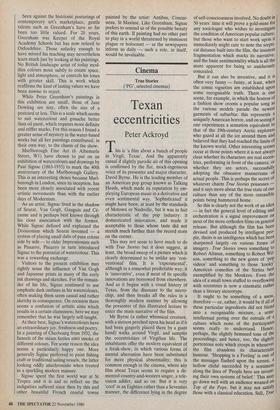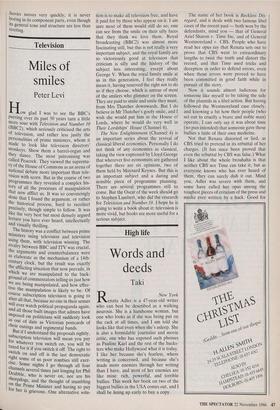Cinema
True Stories (PG', selected cinemas)
Texan eccentricities
Peter Ackroyd
This is 'a film about a bunch of people in Virgil, Texas'. And the apparently casual if slightly parodic air of this opening is confirmed by the flat, mock-ingenuous voice of its presenter and major character, David Byrne. He is the leading member of an American pop group known as Talking Heads, which made its reputation by em- ploying European music in a derivative and even sentimental way. 'Sophisticated' it might have been, at least by the standards of Motown or Nashville, but it was in fact characteristic of the pop industry: it domesticated innovation, and made it acceptable to those whose taste did not stretch much further than the record store on the corner.
This may not seem to have much to do with True Stories but it does suggest, at least, the broad sweep of a picture which is clearly determined to be unlike any 'con- ventional' film. It is 'experimental', although in a somewhat predictable way; it is 'innovative', even if most of its specific innovations are borrowed from elsewhere. And so it begins with a visual history of Texas, from the dinosaur to the micro- chip, and then breaks all the rules in a thoroughly modern manner by allowing the presenter of this illustrated lecture to enter the main narrative of the film.
Mr Byrne (a rather whimsical creature, with a stetson perched upon his head as if it had been gingerly placed there by a giant hand) walks around Virgil, and samples the eccentricities of Virgilian life. The inhabitants offer the modern equivalent of a freak-show, in which various forms of mental aberration have been substituted for mere physical abnormality; this is common enough in the cinema, where any film about Texas seems to require a de- mented country-and-western singer, a tele- vision addict, and so on. But it is very `cool' in an Eighties rather than a Seventies manner, the difference lying in the degree of self-consciousness involved. No doubt in 50 years' time it will prove a gold-mine for any sociologist who wishes to investigate the condition of. American popular culture, but those who want to start work upon it immediately might care to note the scepti- cal distance built into the film, the insistent fragmentation which marks its narrative, and the basic sentimentality which is all the more apparent for being so assiduously concealed.
But it can also be inventive, and it is often very funny — funny, at least, when the comic vignettes are established upon some recognisable truth. There is one scene, for example, in which the hostess of a fashion show croons a popular song as the various models parade the, newest garments of suburbia: this represents a uniquely American horror, and on seeing it one experiences a sensation equivalent to that of the 19th-century Arctic explorers who gazed at all the ice around them and believed that they had reached the limits of the known world. Other interesting scenes occur at those points where it is not always clear whether its characters are real eccen- trics, performing in front of the camera, or whether they are actors, successfully adopting the obsessive mannerisms • of actual people. This is perhaps the secret of whatever charm True Stories possesses,— and it says more about the true state of our culture than any of the more ostensible points being hammered home. So this is clearly not the work of an idiot in fact the general level of editing and orchestration is a signal improvement on most of the more orthodox films on general release. But although the film has been devised and produced by intelligent peo- ple, theirs is an intelligence which has been sharpened largely on various forms of imagery. True Stories owes something to Robert Altman, something to Robert Wil- son, something to the new genre of 'pop videos' and something to those `kooky' American comedies of the Sixties best exemplified by the Monkees. Even the idea of a small town stuffed to overflowing with eccentrics is now a cinematic rather than a literary stereotype. It ought to be something of a mess, therefore — or, rather, it would be if all of these particular ingredients did not blend into a recognisable mixture, a semi- intellectual poring over the entrails of a culture which none of the participants seems really to understand. Hence, perhaps, the slightly bemused tone of the proceedings; and hence, too, the slightly portentous note which creeps in whenever the film abandons its characteristic humour. 'Shopping is a Feeling' is one of the messages flashed upon the screen, a hollow cliché succeeded by a sentiment along the lines of 'People here are invent- ing their own systems of belief.' This maY go down well with an audience weaned on Top of the Pops, but it may not satisfy those with a classical education. Still, True Stories moves very quickly; it is never boring in its component parts, even though its general tone and structure are less than riveting.



























































 Previous page
Previous page